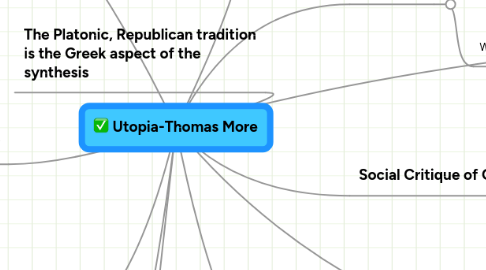Utopia-Thomas More
by max junk


1. The Platonic, Republican tradition is the Greek aspect of the synthesis
2. Slaves are used to do things that people don't want to
3. Christian Synthesis
3.1. The Christian aspect of the synthesis is Christ's gospel of caring for the poor, the oppressed and the downtrodden.
3.2. More wrote Utopia with a comedic tone, allowing him to speak his truth while telling a deeper story.
4. Property Division
4.1. This makes people and the society equal-There is no private property, everyone has the same stuff
4.1.1. There is no private ownership on Utopia, with goods being stored in warehouses and people requesting what they need
5. Slavery
5.1. Slavery is a feature of Utopian life and it is reported that every household has two slaves. The slaves are either from other countries or are the Utopian criminals.
6. Government
6.1. A welfare state is a concept of government where the state plays the primary role in the protection and promotion of the economic and social well-being of its citizens.
7. Happiness
7.1. People find happiness through the ethics of Jesus
7.2. Utopia based on the teaching of Jesus
8. Agriculture is the most important job on the island. Every person is taught it and must live in the countryside, farming, for two years at a time, with women doing the same work as men.
9. Great Britain doesn't conform to Thomas More's principles
10. Overview
10.1. Thomas More's Utopia is a Christian-Humanist view of an ideal society.
10.1.1. More does not simply offer a theoretical view, but provides specifics for how to create this world.
10.2. Working Life
10.2.1. Parallel to this, every citizen must learn at least one of the other essential trades: weaving (mainly done by the women), carpentry, metalsmithing and masonry.
